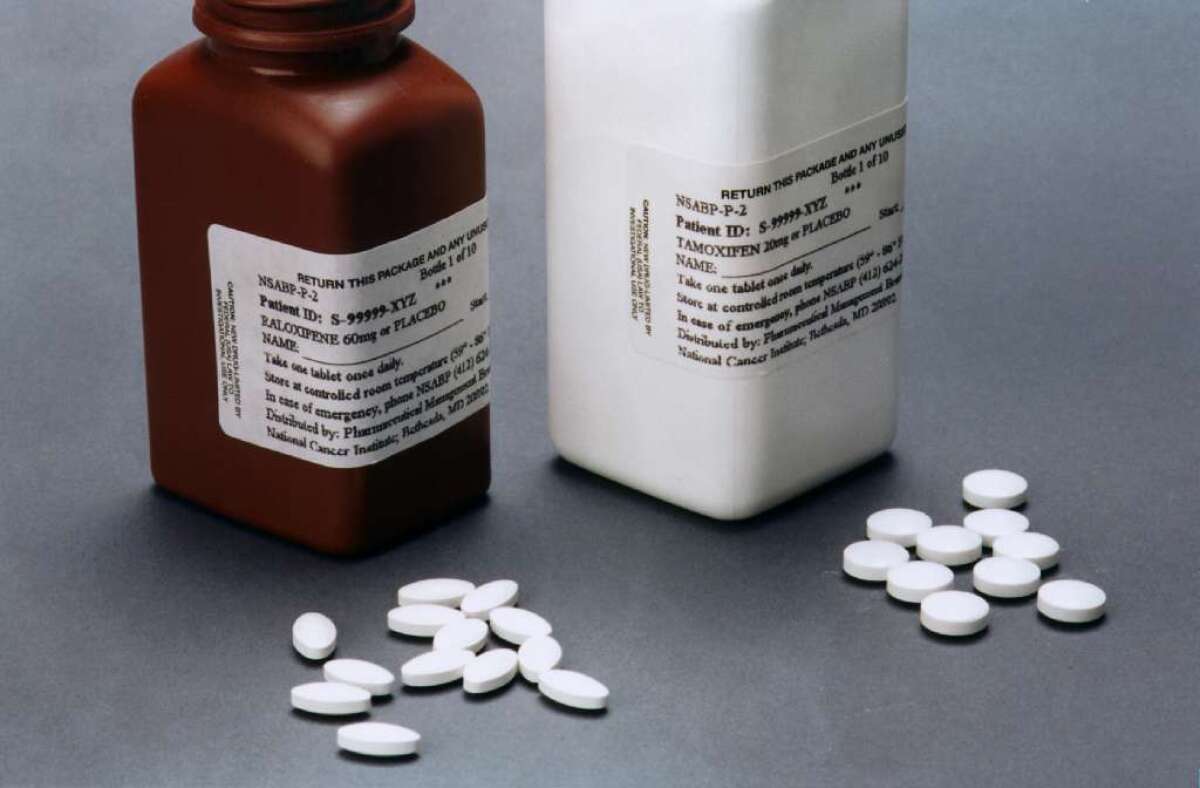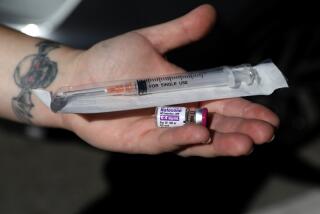Breast cancer prevention drug gives lasting protection, study finds

Taking the cancer drug tamoxifen for five years drives down the incidence of breast cancer in women at high risk for the disease by close to 30%, researchers have found. And the medication’s protective effects against breast cancer appear to last, unabated, for as long as 16 years after a woman stops taking it, a new study says.
The long-awaited IBIS-I trial (short for International Breast Cancer Intervention Study-I) found that tamoxifen was even more effective in preventing breast cancer in women who did not take hormone replacement medications. Women who took tamoxifen and did not take concurrent replacement hormones had a 38% decline in breast cancer diagnoses of any genetic variety over roughly 16 years of follow-up. And new diagnoses of estrogen-sensitive breast cancers -- the most common kind -- dropped by 45% among these women.
That means that for every 22 women who took tamoxifen for five years, there would be one fewer diagnosis of estrogen-sensitive breast cancer over a 20-year period. In an editorial published alongside the IBIS study, Rowan T. Chlebowski, a leading breast cancer researcher at Los Angeles BioMedical Research Institute, called that a “very favorable number.”
This may be good news for the estimated 15% of women between the ages of 35 and 75 who have a roughly 20% lifetime risk of developing breast cancer (double the average woman’s risk). While public attention has focused on prophylactic mastectomies, medications such as tamoxifen offer women at elevated breast cancer risk a vastly less drastic way to drive down the odds of developing such malignancies.
For young women with a family history of the disease, or who carry genetic variations such as BRCA-1 and BRCA-2, the findings are especially reassuring, said Jack Cuzick, an epidemiologist at Queens College London who is one the study’s principal investigators.
Premenopausal women who take tamoxifen now can be assured that their five-year stint on the drug will confer substantial protection from developing breast cancer well into midlife -- and possibly beyond, said Cuzick.
Cuzick cautioned that it would take longer studies still to determine whether breast cancer “chemoprevention” actually drives down breast cancer deaths.
Only 5% of the 7,154 IBIS subjects -- who were between 35 and 70 at the study’s start -- have died. The reduction in new cancer diagnoses during the study’s roughly 16-year follow-up was “striking” among those who took tamoxifen, said Cuzick. But the possibility remains that the medication has merely delayed the appearance of breast tumors, and that those will rear up and claim the lives of tamoxifen-treated women at rates similar to their peers who never took the medication.
That’s a possibility hinted at in the IBIS-I findings. Among the 3,579 women who took tamoxifen, there were 31 breast cancer deaths, compared with 26 among the 3,575 taking placebo. Whether that slightly higher breast cancer death rate is a fluke or stems from treatment “needs to be addressed,” Chlebowski wrote in his Lancet editorial.
Tamoxifen has been prescribed for decades to prevent recurrence of breast cancer in women who have been treated for an initial case. It’s thought to reduce first instances of breast cancers, and repeat cases as well, by blocking the action of the female hormone estrogen throughout the body.
Despite consistent evidence that the medication is effective in warding off first breast cancer diagnoses among women at high risk, very few such women take it while they are still healthy.
Women’s widespread fears about side effects is partly to blame: in some, tamoxifen intensifies menopausal symptoms such as hot flashes and vaginal dryness. In the IBIS-I trial, as in everyday clinical practice, many women have sought out hormone-replacement therapy as an antidote to those side effects.
“Our trial shows pretty clearly that it’s not a good idea” for women at high risk of breast cancer to take hormone-replacement medication, even if they’re on tamoxifen, Cuzick said.
In recent years, researchers have shown that another class of medication that blunts estrogen’s effects -- aromatase inhibitors such as exemestane, anastrozole and letrozole (marketed as Aromasin, Arimidex and Femara) -- drive down rates of breast cancer in older women, whose ovaries are producing little to no estrogen. A second medication that works in the same way that tamoxifen does -- the osteoporosis drug raloxifene (marketed as Evista) -- also drives down breast cancer incidence in women after menopause.
Those medications are better choices for postmenopausal women, said Cuzick, as they appear to be more effective and have fewer side effects than tamoxifen.
“But for premenopausal women, tamoxifen remains the only choice, and it is a good one,” he said.
The IBIS-I study was published Thursday in the journal Lancet Oncology. The findings are also to be presented in San Antonio this week at the American Assn. for Cancer Research’s Breast Cancer Symposium.
The IBIS-I trial did turn up a worrisome finding, although investigators are unsure of its significance. Women taking tamoxifen are at slightly greater risk of developing endometrial cancers while they are on the drug -- a long-recognized trend that has raised few concerns because such cancers tend to be slow-growing and readily treatable.
But in the tamoxifen arm of the IBIS-I trial, five women died of endometrial cancers (compared with no such deaths in those taking placebo), and all the deaths occurred after tamoxifen treatment had ended. While IBIS-I investigators said the finding could be due to chance, they warned that tamoxifen’s links to endometrial cancers bear continued watching.
Follow me on Twitter @LATMelissaHealy and “like” Los Angeles Times Science & Health on Facebook.







